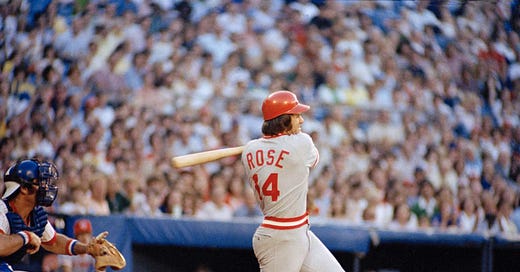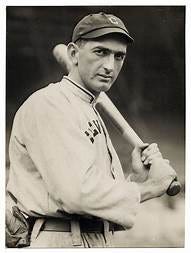Rob Manfred changes the definition of "Lifetime Ban"
MLB's Rule 21 is "remade" in the 21st Century
MLB Commissioner Rob Manfred forever changed the definition of the term “Lifetime Ban” or as phrased in MLB Rule 21 “permanently ineligible” on Tuesday. (Rule 21 is provided here courtesy of MLB.COM Rule 21 - Text )
The monumental decision comes after a meeting with Jeffrey Lenkov back in January to update Rose's status now that he was deceased. The topic and effort was given more traction when President Trump threw his support behind Rose being eligible for the MLB Hall of Fame in February via a social media post.
MLB made public a letter from Manfred to Lenkov regarding reinstatement of Rose from the permanently ineligible list. In Manfred’s response he wrote the following:
"Dear Mr. Lenkov:
"I write in response to your letter on behalf of the Rose family on January 8, 2025, and the request contained therein that Pete Rose be posthumously removed from the permanently ineligible list. As you know, I denied a prior request for reinstatement from Mr. Rose in 2015. In my view, the only salient fact that has changed since that decision is that Mr. Rose has recently passed away.
"The question of whether an individual should remain on the permanently ineligible list after his death has never been formally addressed by Major League Baseball. Indeed, Mr. Rose is the first person banned by a Commissioner other than Kenesaw Mountain Landis to die while still on the ineligible list. As such, it is incumbent upon the Office of the Commissioner to reach a policy decision regarding this unprecedented issue in the modern era.
"The phrase "lifetime ban" has often been used to describe the punishment agreed to by Mr. Rose and the Office of the Commissioner; however, the use of that phrase is not accurate. In fact, the 1989 agreement between Mr. Rose and the Office of the Commissioner tracks the actual language of Rule 21 and Mr. Rose was placed on the "permanently ineligible" list referenced in Rule 21.
"In my view, a determination must be made regarding how the phrase ‘permanently ineligible’ should be interpreted in light of the purposes and policies behind Rule 21, which are to: (1) protect the game from individuals who pose a risk to the integrity of the sport by prohibiting the participation of such individuals; and (2) create a deterrent effect that reduces the likelihood of future violations by others.
"In my view, once an individual has passed away, the purposes of Rule 21 have been served. Obviously, a person no longer with us cannot represent a threat to the integrity of the game. Moreover, it is hard to conceive of a penalty that has more deterrent effect than one that lasts a lifetime with no reprieve. Therefore, I have concluded that permanent ineligibility ends upon the passing of the disciplined individual, and Mr. Rose will be removed from the permanently ineligible list."
"While it is my preference not to disturb decisions made by prior Commissioners, Mr. Rose was not placed on the permanently ineligible list by Commissioner action but rather as the result of a 1989 settlement of potential litigation with the Commissioner's Office. My decision today is consistent with Commissioner Giamatti's expectations of that agreement. In the press conference announcing the settlement with Mr. Rose, Commissioner Giamatti answered a question about the effect of the settlement on Mr. Rose's potential election to the Hall of Fame:
"Giamatti: 'Let me- I'm glad you - I wondered when I'd be asked about the Hall of Fame. Let me say this. This episode has been about, in many ways, has been about taking responsibility, and taking responsibility for one's own acts. I know I need not point out to the Baseball Writers of America that it is their responsibility who decides who goes into the Hall of Fame. It is not mine. You have the authority, and you have the responsibility. And you will make your own individual judgments. And when they are tallied by Mr. Lang, that's, will be it. I have never, as League President or Commissioner, and would never, in this or any other instance, express an opinion about the eligibility, viability or appropriateness of any candidate for the Hall of Fame. It is entirely in your - now, you have a responsibility, which I, of course, as a devoted reader of all of you, will look forward to listening and watching your debates on the relationship of life to art, which you will all have to work out for yourselves.'"
"Commissioner Giamatti's comments were completely reasonable given that, at the time, the Hall of Fame did not have a rule barring people on the permanently ineligible list from Hall of Fame consideration. In fact, Shoeless Joe Jackson was afforded the opportunity to be voted upon in 1936 and again in 1946.
"In closing, I want to emphasize that it is not part of my responsibility or authority to express any view concerning Mr. Rose's consideration by or possible election to the Hall of Fame. I agree with Commissioner Giamatti that responsibility for that decision lies with the Hall of Fame.
"Sincerely,
Robert D. Manfred Jr."
The Aftermath
The long term effects of Manfred’s redefinition of “permanently ineligible” remain to be seen. Rose is not the only one affected by this change to the MLB dictionary. There are 16 other players who now have had their transgressions involving Rule 21 wiped away due to their death.
Most notable are the eight players, who were banned by then Commissioner Landis, in the infamous “Black Sox” scandal for throwing the 1919 World Series. The players immortalized in the movie “Eight Men Out” Eddie Cicotte, Happy Felsch, Chick Gandil, Fred McMullen, Swede Risberg, Buck Weaver, Lefty Williams and “Shoeless” Joe Jackson. Additionally, a ninth player Joe Gedeon, was banned for knowledge of the effort to throw the series. Of this group Buck Weaver consistently denied participation in the scheme until his passing in 1956.
Others received the ultimate punishment for either betting, illegal loans, game fixing, auto theft and bribery. The lesser known guilty parties were Gene Paulette, Benny Kauff, Cozy Dolan, Jimmy O’Connell, Lee Magee, Phil Douglas and William Cox.
The real issue to be dealt with is whether or not Rose and Jackson should be considered for entry into the Baseball Hall of Fame. In Jackson’s case there is some evidence that he did not participate in the scandal and may even have tried to warn White Sox Owner Charles Comiskey. There is also the issue of a document signed by Jackson which was a waiver of immunity, despite the fact that Jackson was functionally illiterate. With respect to his playing days, he was one of the most feared and consistent hitters of his era as shown by his lifetime MLB statistics.
Given the peculiar history regarding Jackson’s “supposed” involvement in the 1919 World Series scandal, there may be enough sympathy and the healing power of time to allow his entry into the Hall of Fame. I for one would not be opposed to such an outcome.
Rose’s case is slightly more complicated. There is no doubt that Pete Rose was a great player and his statistics bear that out. Rose earned the nickname “Charley Hustle” by his fierce and almost maniacal level of play. He would stretch singles to doubles, doubles to triples and leg out base hits almost at will! He never gave up on a ball hit in his direction on the ground or in the air.
He was equally aggressive on the basepaths, even in All Star Games. All one has to do is Google “Pete Rose vs. Ray Fosse” and watch the video of Rose barreling over the Cleveland standout catcher and rising star in the 1970 mid-season game. Fosse fractured and separated his left shoulder and was never the same player again over his 12 year MLB career.
The issue with Rose stems from his betting on the Cincinnati Reds games while he was the teams manager. He was investigated by MLB and was ultimately banned by then commissioner Bart Giamatti in 1989. While public sentiment has always been mixed with respect to his eligibility for the Hall of Fame, in recent years, it picked up steam again when Rose died on September 30th last fall. While there may be a rush to put Rose in the HOF quickly following Manfred’s decision, I would suspect that it will take longer for this to play out.
In the end, we have entered a new phase of the evaluation of a player’s eligibility for the HOF. Do we allow entry after death based on statistics and ignore the transgressions made that brought disgrace to the game? OR Do we take everything about the player’s life to be fair game in granting admittance? The answer to both these questions will be played out before us at some point. In the meantime it opens more questions than answers and more fodder for debate.









